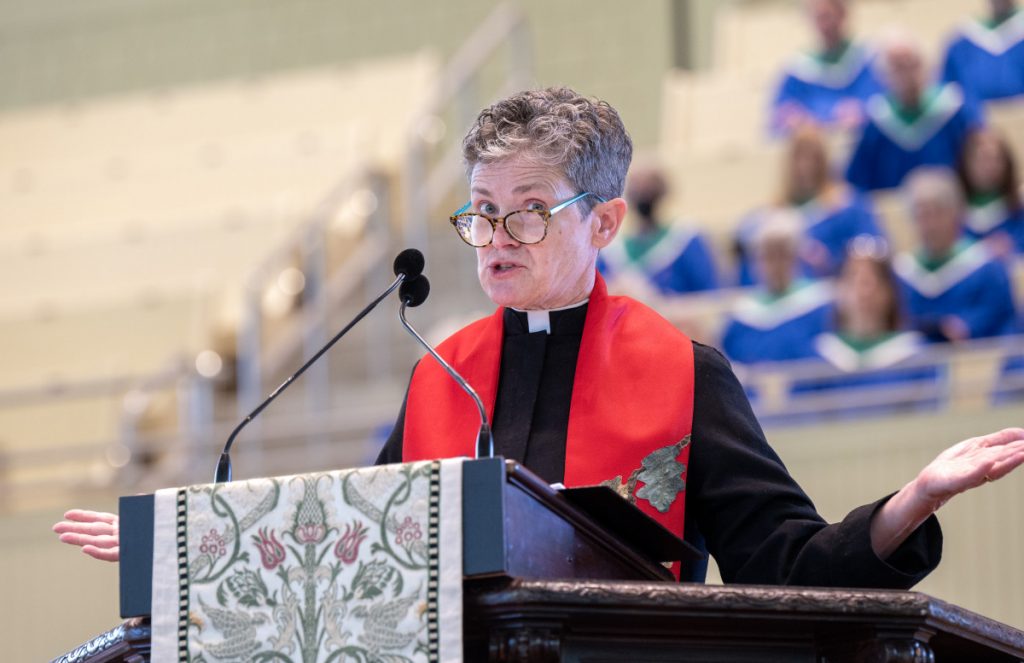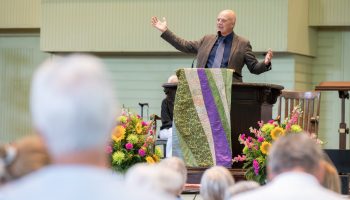
The Rev. Kate Braestrup delivers her sermon “In the Country of the Gerasenes” during the morning worship service on Sunday in the Amphitheater.
Although she is the chaplain for the Maine Warden Service, the Rev. Kate Braestrup does not think of herself as an “outdoorsy” person. “I like to read, but I am descended from an outdoorsy person, my late mother. She was a bit eccentric,” Braestrup said.
Braestrup preached at the 9:15 a.m. Monday morning worship service in the Amphitheater. Her sermon title was “Pain and Paul,” and the scripture reading was Acts 9:1-9.
About 30 years ago, her mother had a farm. To get to the feed store, Mom had a pickup truck named Merle. One day when Braestrup was visiting, she went to the store with her mother. They were talking about animal husbandry as they drove down the driveway. Braestrup noticed that the truck’s glass was so covered with dirt it was almost opaque.
Braestup pointed out how dirty the windshield was, but her mother said, “I can see.” Braestrup said, “No you can’t; use the wiper washer.” Mom said, “I have to get gas, so when I stop I will clean it.” Braestrup answered, “Mom, use the wiper.”
“The what?,” Mom asked. “The little squirty thing,” said Braestrup. Mom looked blankly at Braestrup who reached over and started the wipers and a jet of fluid came out.
“There was an arc of streaky clarity as the wiper blades did their work,” Braestrup said.
“Neato,” said Mom. She had never seen the wipers work.
Braestrup said the story might make her mother sound like an idiot, but she wasn’t — Mom was very smart and capable.
“We all have blind spots, and how stubbornly we cling to those blind spots,” she said. “My mother had a saying: ‘People don’t change until it hurts.’ ”
That echoes what recovering addicts have said, she told the congregation. You have to hit bottom, to be in sufficient pain, in prison, away from everyone you love, with the threat that you will die in an undignified way, in order to change.
In the Gospels, people find Jesus in order to be healed. In the reading in Acts, Jesus found Saul, who was not in pain but living a rather privileged life for a man of the first century. Yet, he changed.
As in Psalm 73:6, Saul wore pride as a necklace and was clothed in violence. He was born in Tarsus, a college town, possibly about the same time as Jesus, Braestrup said. He went to Jeruslaem and studied at the school of Gamaliel, so he was well educated in Hebrew scripture and Greek philosophy.
“He was into suppression of an irritatingly religious wack job called ‘The Way.’ He had no obvious need to change; he was in pain. He was still breathing threats of murder and not seeking transformation,” Braestrup said.
She continued, “Transformation came to him. Jesus asked him, ‘Why are you persecuting me?’ Saul asked, ‘Who are you?’ and Jesus said, ‘I am Jesus, whom you are persecuting.’ Saul then said, ‘What do you want me to do?’ ”
Saul’s actions in persecuting Jesus’ followers were “kicking against the goads,” a pointless, painful resistance to Jesus.
“Saul was a Christian catcher; it was plain as day to those he was prosecuting,” Braestrup said. “If Saul accepted the truth, that he had been living a lie, then all the people he admired would be revealed to be flawed and self-serving.”
She said, “Why not continue to see through a glass darkly and not a revealing lens?”
God’s work comes in a paradox: “Jesus healed the blind; Jesus blinded Saul. It is a mirror image of the Gospel encounters,” Braestrup said. “Saul is not a poor, sick man but a rich, strong man weakened by inflicting pain.”
As Saul became Paul, through the hospitality of Ananais, he was no longer normal to those around him.
“He had changed and he was uncomfortable and he made others uncomfortable,” she said. “He was a pain in the neck and people plotted to kill him. He endured theological conflict, prison, threats and death by beheading.”
Clement I, bishop of Rome, wrote about Paul in his epistle 1 Clement 5:5-6.
“By reason of jealousy and strife, Paul by his example pointed out the prize of patient endurance. After that he had been seven times in bonds, had been driven into exile, had been stoned (not in a good way, said Braestrup), had preached in the East and in the West; he won the noble renown which was the reward of his faith, having taught righteousness unto the whole world and having reached the farthest bounds of the West; and when he had borne his testimony before the rulers, so he departed from the world and went unto the holy place, having been found a notable pattern of patient endurance.”
Braestrup said there was a pattern of patience and endurance in Paul’s life. She called his reward for change “a mixed bag, but he had the truth. Is it better to have the truth or not? Moral blindness is more comfortable, a way to avoid seeing and a way to avoid danger.”
Even though her mother told her that people will not change until it hurts, “Christians change and keep changing out of our comfortable blindness,” Braestrup told the congregation. “We change not for our own sake, but for God’s.”
She recalled a Christian pop band she heard often on her drive to seminary that had a song about faith as washing the windshield.
“There are dirt and bugs on the windshield, and we could adjust to not seeing — or, if we are committed to clarity, to expose ourselves to new ideas,” she said. “Here at Chautauqua, we ponder, pray, question and sing. We confirm our commitment to the truth just by being at Chautauqua.”
She continued, “Year after year, we commit to clean the windshield. Christ reveals our shortcomings, but we are bound to God by grace. ‘Neato’ and Hallelujah.” The congregation applauded.
The Rt. Rev. Eugene Taylor Sutton, senior pastor for Chautauqua Institution, presided. Sonya Subyya Sutton, musician, composer and writer, read the scripture. The prelude was “Allegretto,” from Four Sketches for Pedal-Piano by Robert Schumann, played by Joshua Stafford, director of sacred music and the Jared Jacobsen Chair for the Organist on the Massey Memorial Organ. For the anthem, the Motet Choir sang “Share with the hungry your bread,” music by Carol Muehlig and words by Annemarie Kidder. The choir was directed by and accompanied by Stafford on the Massey Organ. For the postlude, Stafford played “Nicht zu schnell und sehr markiert,” from Four Sketches for Pedal-Piano on the Massey Organ. Support for this week’s chaplaincy and services is provided by the Jackson-Carnahan Memorial Chaplaincy and the John William Tyrrell Endowment for Religion.




